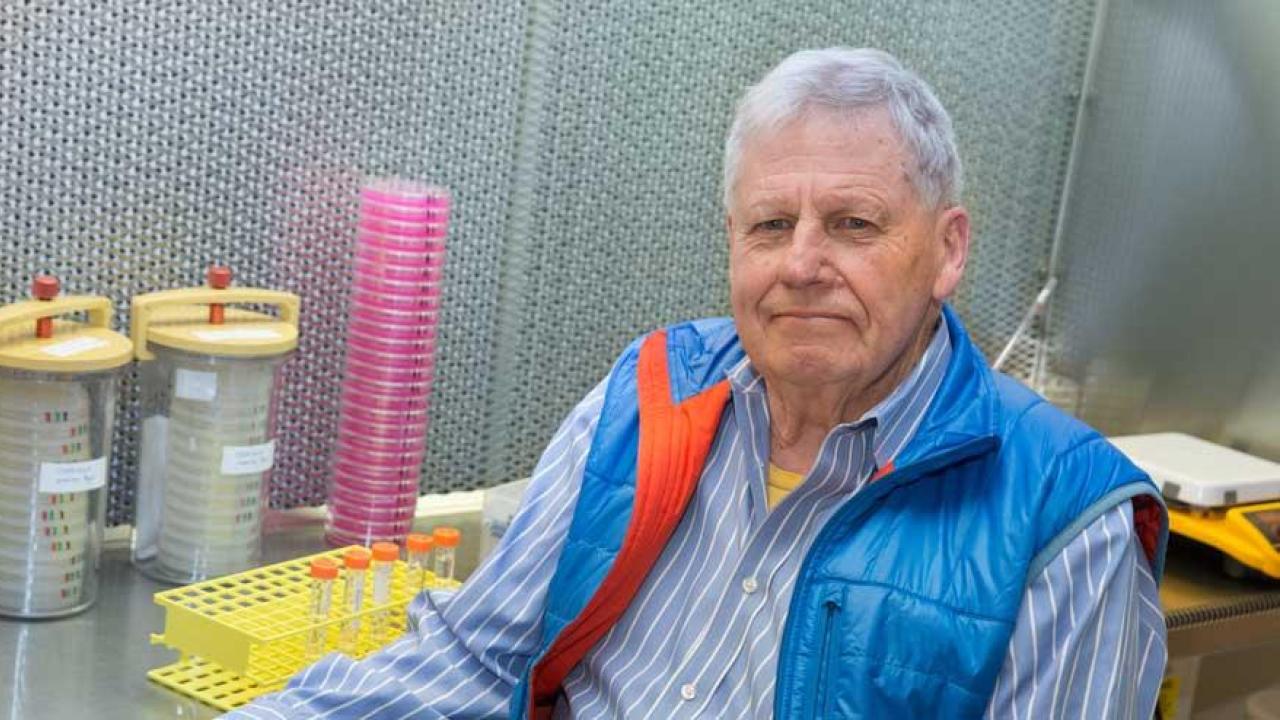
JaRue Manning Honored as ‘Double’ Distinguished Emeritus
JaRue Manning recently received the Distinguished Emeritus Award for 2017. But, in his case, let’s call it the “Double” Distinguished Emeritus Award. For, he not only continues to teach microbiology, the field in which he took emeritus status in 2008, but also has educated himself in another discipline, viticulture and enology.
“Professor Manning literally reinvented himself after his retirement as a wine scholar,” Professor Wolf-Dietrich Heyer wrote in nominating Manning for the Distinguished Emeritus Award, given by the UC Davis Emeriti Association. Heyer is the chair of Manning’s home department, microbiology and molecular genetics in the College of Biological Sciences.
Andrew Waterhouse, professor of viticulture and enology, wrote a letter in support of the nomination, saying: “I can say without a doubt that JaRue is one of the most active (emeriti) I have ever witnessed. And, unusually, when most emeriti’s efforts remain close to their original areas of expertise, JaRue’s seem to have gotten progressively wider.”
Waterhouse noted how Manning developed an interest in Italian wines through his many research collaborations and through extensive travels there. “To further that knowledge, he audited virtually every one of VEN’s classes, and attended most of the extension classes and field days,” Waterhouse said.
He said Manning worked with VEN’s student wine tasting group, Vitis, to make presentations about Italian regions and their wines, and often augmented the tastings with wines he brought back from Italy. “Student tastings are usually led by the most knowledgeable student, but, in this case, students had the pleasure of being led by a virtual walking textbook of Italian wine knowledge,” Waterhouse wrote.
More recently, Manning has advocated for the importation of Italian cultivars that are not now included in UC Davis’ collection, according to Waterhouse, adding that Manning is particularly interested in Nebbiolo, one of Italy’s most highly respected cultivars but one with a reputation as being among the most difficult to grow. “JaRue has worked toward establishing a research trial aimed at comparing ‘superior’ selections of Nebbiolo in the Sierra foothills,” Waterhouse said.
Axel Borg, distinguished research librarian in wine and food science at UC Davis, also supported Manning’s nomination, noting how, in retirement, he began engaging in science in a new way — not only as a “scientist” (relying on experiments) but also as a “humanist” (telling science history by critically examining the written record).
“This is both very unique and extremely important,” Borg said. “Professor Maynard Amerine (legendary faculty member in the Department of Viticulture and Enology) said that only a scientist could adequately write the history of science, because of the need to understand the science behind the history.
“To do this, Professor Manning has, over the course of almost two decades, engaged librarians in the social sciences and humanities about how their faculty members do research in the written record. At the same time, he immersed himself in the written record, both published and unpublished.
“In essence, he took his academic abilities in inquiry and observation, retrained himself in another discipline and began to examine that scientific field with the lens of a humanist. This is extraordinarily difficult, and I was there to witness many of his struggles with this other form of academic inquiry. This is utterly remarkable.”
Manning has studied the unpublished papers of faculty and others in the area of viticulture and enology, and, at Professor Heyer’s encouragement, taken on a project to document the history of the Department of Microbiology and Molecular Genetics at UC Davis, dating back to 1897 and a course in bacteriology offered by Professor Frederic Bioletti.
Media Resources
- This story first appeared on UC Davis News
